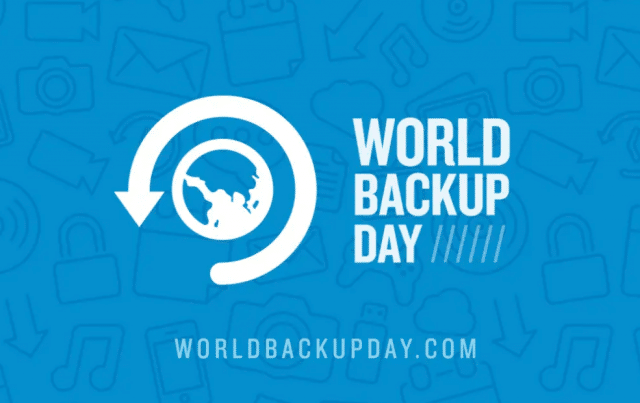World Backup Day -- your annual reminder that you need to look after your data

Today -- which of course you knew already -- is World Backup Day, an idea that began in 2011 as a reminder from a group of Reddit users who had seen too many people lose their important files. They deliberately picked the day before April Fool's to get across that you’d be a fool not to backup your data.
Although it started a bit of a joke it's become a useful reminder that backups are important and figures in the industry now see it as good for raising awareness. Here’s what some of them think.
Sean Deuby, principal technologist at Semperis, says, "The celebration of the 15th anniversary of World Backup Day serves as a reminder for individuals and businesses to reflect on their data protection strategies and ensure their data is adequately safeguarded. Quality backup is the linchpin of business resilience, shielding against data loss and ransomware threats, and ensuring swift recovery in the face of unforeseen challenges."
This is echoed by Fred Lherault, field CTO, EMEA/emerging markets at Pure Storage, "The 31st of March marks World Backup Day, serving as an important reminder for businesses to reassess their data protection strategies in the wake of an ever-evolving, and ever-growing threat landscape. However, cyber attackers aren't in need of a reminder, and are probing for vulnerabilities 24/7 in order to invade systems. Given the valuable and sensitive nature of data, whether it resides in the public sector, healthcare, financial services or any other industry, businesses can’t afford to think about backup just one day per year."
Richard Copeland, CEO of Leaseweb USA, says, "Skipping backup isn't just a bad idea - it’s a ticking time bomb. Many companies think they’re saving money by relying on hardware redundancy or high availability, only to get blindsided when their data vanishes. One wrong click, one system crash, or one ransomware attack, and suddenly, they’re in full-blown disaster mode, scrambling to recover what’s lost. No backup? No safety net. Just downtime, financial hemorrhaging, and a whole lot of regret."
The rise of AI highlights the need to protect the underlying data says Greg Clark, director of product management, data security at OpenText Cybersecurity:
As AI implementation across industries continues to grow, businesses are becoming increasingly reliant on data for AI-driven decision making and model training. This continued technological advancement means organizations are generating and storing more data than ever, requiring them to proactively manage their data – starting with data minimization.
Backups are essential for organizations to maintain business continuity and respond swiftly in the event of a cyberattack. However, organizations must be mindful of the data they’re backing up. Not all data is critical -- 33 percent is redundant, obsolete, or trivial (ROT). By identifying and eliminating unnecessary data and retiring outdated applications, businesses can significantly reduce their attack surface and bolster their security postures. Not only does data minimization ensure that organizations are more resilient in the face of security threats, but it helps improve operational efficiency by freeing up valuable storage and resources. Additionally, as AI adoption grows and regulations evolve, minimizing excess data gives businesses greater control over their sensitive information, reducing the complexity and cost of compliance and safeguarding operations across an organization.
Ilia Sotnikov, security strategist at Netwrix says backups should be planned with recovery objectives in mind. "Security teams should identify and classify their organization's most valuable data, separate critical system components from less important ones, and establish different backup and recovery strategies for them in accordance with business goals and priorities. This approach helps save both money and time in backup operations. More importantly, it ensures that recovery of critical data and content is not delayed by restoration of less important systems."
"Regularly backing up your files is crucial for data protection, business continuity, and cybersecurity resilience. Without a solid backup strategy, businesses risk data loss, downtime, and financial damage from threats like ransomware or hardware failures," says Steve Sandford, partner, digital forensics and incident response at cybersecurity consultancy CyXcel. "Follow the 3-2-1 backup rule -- keep three copies, store two on different media, and one offsite. Automate backups, encrypt data, and use immutable storage to prevent tampering. Regular integrity testing also ensures recoverability when needed. A well-structured backup plan reduces risks, ensures compliance, and strengthens disaster recovery, keeping your organization secure and operational in the face of cyber incidents."
Randolph Barr, CISO at Cequence, echoes the need for keeping backups separate, "To defend against threats like ransomware, backups must be stored separately from primary systems ideally in isolated or offline environments -- and protected with encryption at rest. These controls help ensure that backup data remains secure and accessible even if production systems are compromised, giving organizations a reliable path to recovery."
Finally there’s a timely reminder from Don Boxley, CEO and co-Founder of DH2i that backups alone are not enough:
World Backup Day is a great reminder that just having backups isn't enough. Sure, they're critical for recovery, but they don't keep your business running in real-time. If something goes wrong -- whether it's a system crash, a cyberattack, or just someone making an honest mistake -- you need more than a backup. You need a plan that keeps your data within reach and your business running like nothing ever happened.
Because here's the thing… When downtime happens, waiting around for a backup to restore isn't an option. Businesses need to stay up and running, no matter what. That means thinking beyond just storing copies of data and making sure it’s always accessible, secure, and easy to recover. At the end of the day, it's not just about backing up -- it's about making sure you never have to hit pause in the first place.
